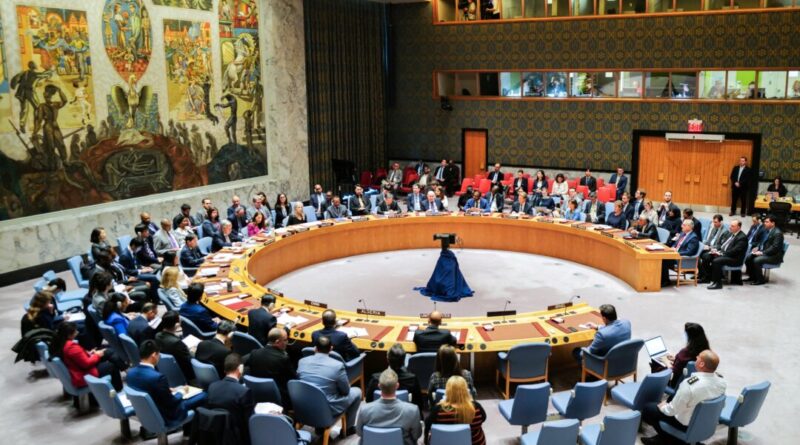Moscow Aligns with Western Powers in Calling for Restraint Following Iranian Attacks on Israel
Israel’s war cabinet is currently considering its response to a barrage by Tehran amid international calls to reduce tensions.
The Kremlin has reiterated calls for restraint following a drone and missile barrage on Israel carried out by Iran over the weekend.
“We’re extremely concerned about the escalation of tension in the region,” Kremlin spokesman Dmitry Peskov said on April 15.
“We call on all countries in the region to exercise restraint.”
Mr. Peskov also told reporters that further escalation was “in no one’s interest.”
His remarks come in the wake of a wide-ranging Iranian drone and missile attack on several targets in Israel on April 13.
The barrage, which was largely neutralized by Israel’s Iron Dome air-defense system, was a response to an April 1 Israeli airstrike on Iran’s embassy in Syria.
Tehran had vowed a “harsh response” to the Israeli airstrike, which killed seven high-ranking Iranian military officers and at least six Syrian nationals.
Asked about Iran’s retaliatory barrage, which caused limited damage in Israel, Mr. Peskov said Moscow hoped to see the crisis resolved politically rather than militarily.
Anatoly Viktorov, Russia’s ambassador to Israel, voiced hope that Israel would refrain from further escalations and take a “reasonable approach” to the crisis.
“The Iranian side clearly stated that the incident is over and that it is not going to take any further actions,” Mr. Viktorov said in televised remarks.
In a statement released after the barrage, Iran’s U.N. mission said Tehran considered the matter closed—barring further aggressive actions by Israel.
“The matter can be deemed concluded,” it said. “But should the Israeli regime make another mistake, Iran’s response will be considerably more severe.”
It also called on the United States—long seen as Israel’s No. 1 ally—to “stay away” from the conflict.
On April 14, Russian Foreign Minister Sergey Lavrov spoke by phone with his Iranian counterpart, Hossein Amir-Abdollahian.
During the call, Mr. Amir-Abdollahian “positively assessed Russia’s position regarding [Iran’s] legitimate actions … and its efforts to preempt further escalation,” according to a Russian Foreign Ministry statement.
Russia is closely aligned with Iran, especially in Syria.
Since 2015, both countries have maintained military forces in Syria—at Syria’s invitation—to support the Syrian army and government.
In a rare sign of convergence between Moscow and the West, leading European states—including the UK, France, and Germany—issued similar calls for restraint.
“We’re on the edge of the cliff and we have to move away from it,” European Union foreign policy chief Josep Borrell said in remarks to the Spanish media.
“We have to step on the brakes and reverse gear.”
Washington has stressed its “ironclad” commitment to Israel’s security while also asserting its desire to avoid further escalation.
“As the president has said many times, we don’t seek a wider war in the region,” John Kirby, White House national security spokesman, said in televised comments on April 14.
“We don’t seek a war with Iran.”
On the evening of April 13, Iran fired more than 300 attack drones and missiles at targets in Israel.
The barrage, which appears to have been limited to military targets, caused minimal damage, with most incoming missiles and drones intercepted by the Iron Dome.
No fatalities were reported as a result of the strikes, which U.S., UK, and Jordanian militaries reportedly helped intercept.
Tehran has called the attack a “legitimate” response to Israel’s “repeated crimes,” including the deadly April 1 airstrike on the Iranian Embassy in Syria.
On the afternoon of April 15, Israel’s war cabinet convened—for the second time in as many days—amid reports of differences over how to respond.
In earlier comments, Benny Gantz, Israel’s minister without portfolio (and former defense minister), vowed that his country would “exact a price from Iran” after forging a regional coalition.
Israeli Defense Minister Yoav Gallant also called for forging an international alliance to counter what he described as the “grave threat” posed by Iran.
Neither of them, however, stated what countries—regional or otherwise—might be willing to join the proposed coalition.
Mr. Viktorov cautioned Israel against adopting an “eye-for-an-eye” approach to the crisis, which he said could ignite a “region-wide war.”
He also said certain hardline members of Israel’s war cabinet were calling for “immediate offensive actions” against Iran.
“But most of them believe this should be given careful thought and that there is no need to make any hasty decisions,” he said.
Mr. Viktorov also questioned Washington’s stated desire to avoid further escalation.
“Time will tell whether the United States seeks to stabilize the situation [in the region] or fan the flames,” the diplomat said.
On the evening of April 15, Israeli media reported that the war cabinet had discussed a “range of options” for hurting Iran without sparking an all-out war.
In an unsourced report, Israel’s Channel 12 said the government sought to coordinate its response with the United States despite earlier assertions by Washington that it would not take part in any direct attack on Iran.
Reuters contributed to this report.



